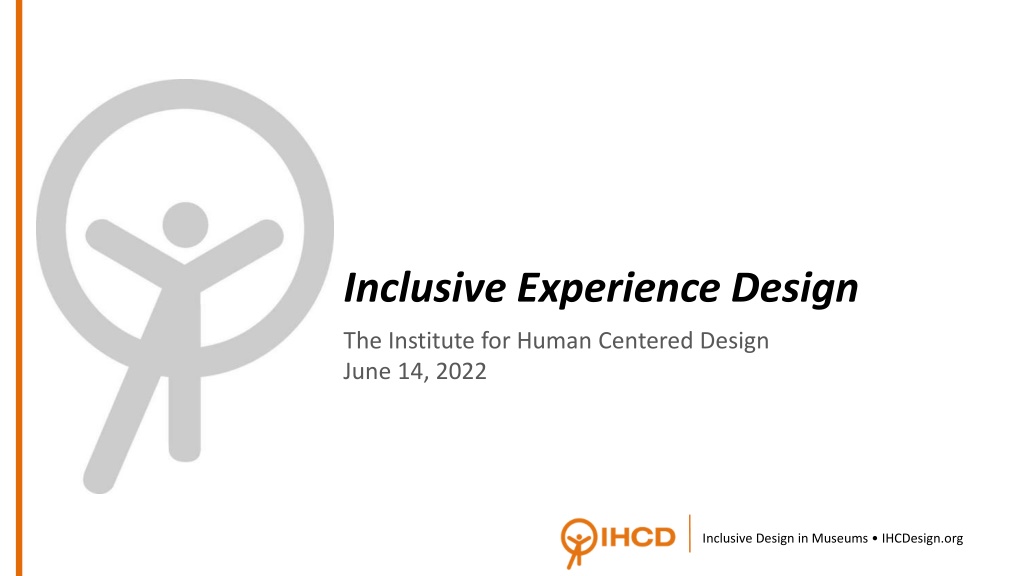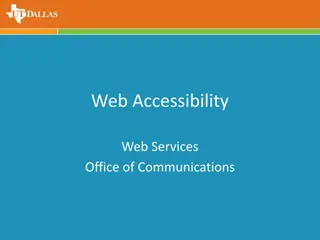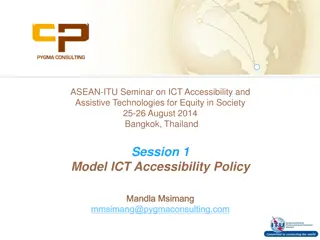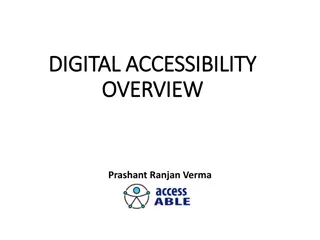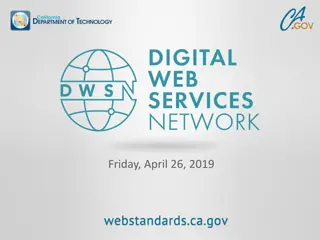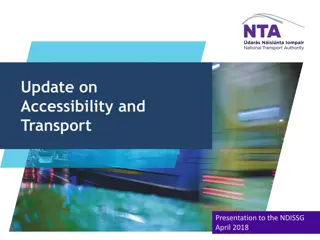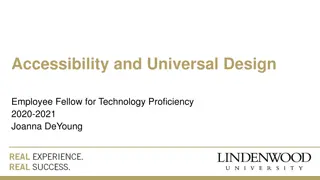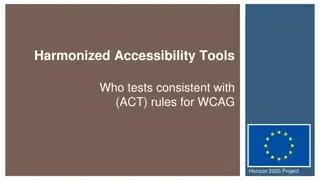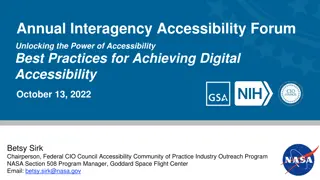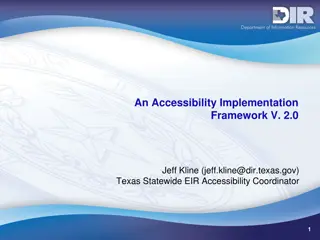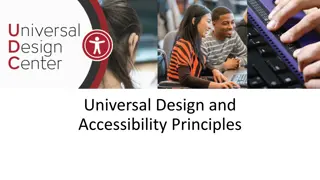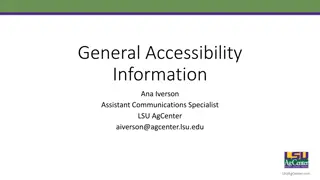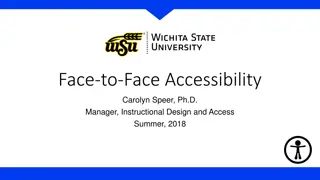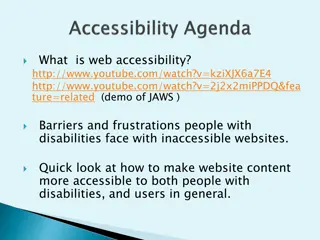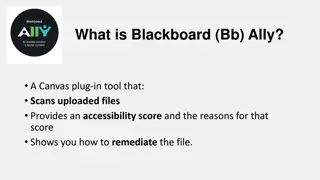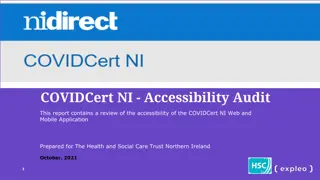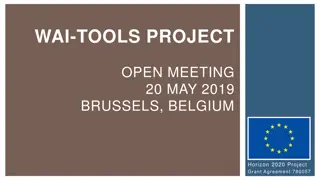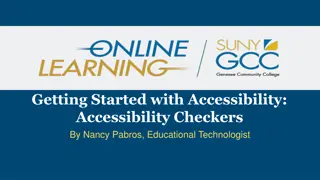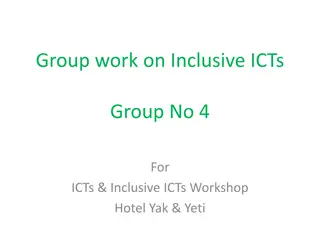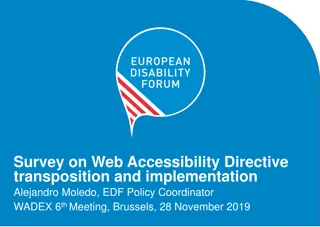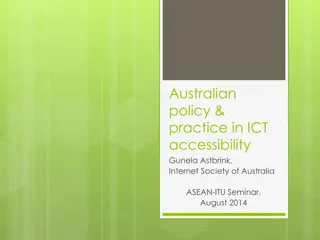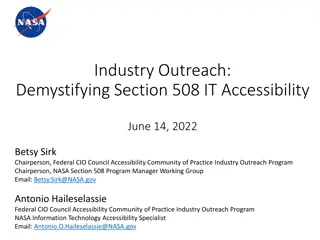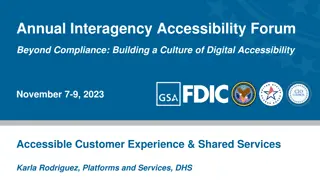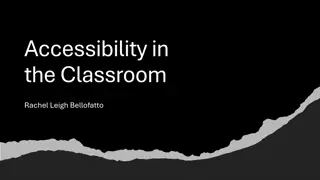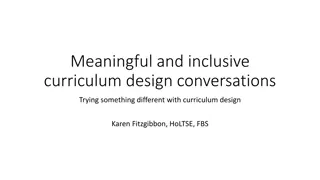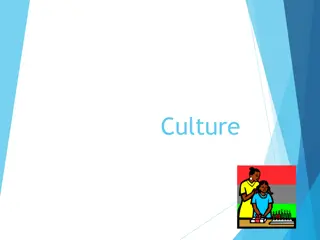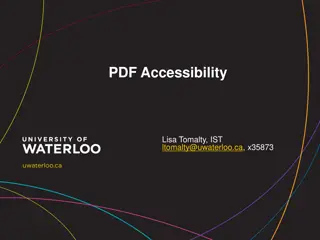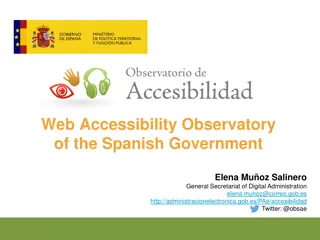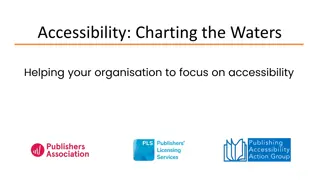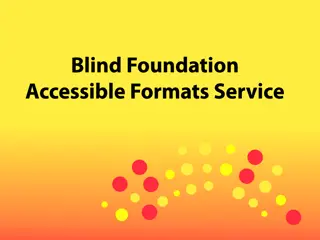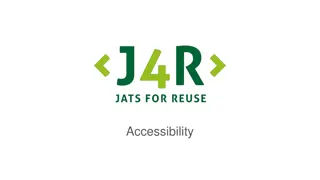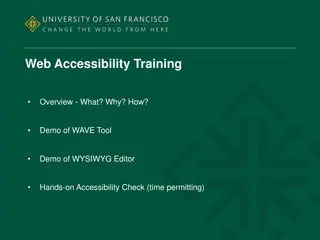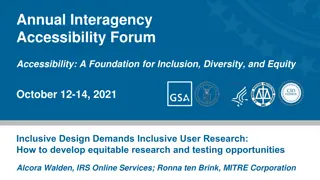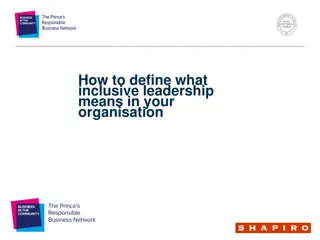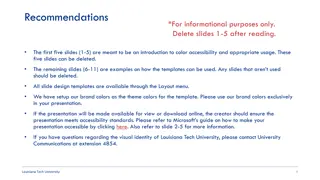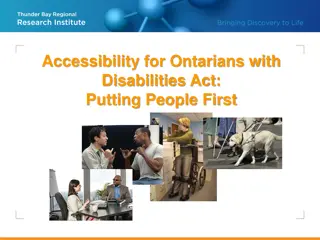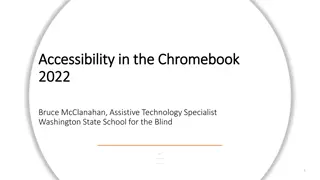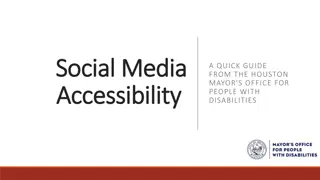Inclusive Experience Design: Enhancing Cultural Accessibility
The Institute for Human Centered Design is a 44-year-old non-profit organization dedicated to enhancing experiences for people of all ages, abilities, and cultures through excellence in design. Their core beliefs emphasize the impact of design on daily lives and the importance of designing for inclusion. With a mission to build client capacity for inclusive design, their primary audience is people with disabilities, focusing on promoting diversity, equity, accessibility, and inclusion in museums and society as a whole.
Download Presentation

Please find below an Image/Link to download the presentation.
The content on the website is provided AS IS for your information and personal use only. It may not be sold, licensed, or shared on other websites without obtaining consent from the author. Download presentation by click this link. If you encounter any issues during the download, it is possible that the publisher has removed the file from their server.
E N D
Presentation Transcript
Inclusive Experience Design The Institute for Human Centered Design June 14, 2022 Inclusive Design in Museums IHCDesign.org
A 44-year old international education and design non-profit dedicated to enhancing the experiences of people of all ages, abilities and cultures through excellence in design. IHCDesign.org 200 Portland Street Boston, MA 02114 617-695-1225
Our Cultural Projects Team Gabriela Bonome-Sims Deputy Director Valerie Fletcher Executive Director Anoopa Sundararajan Human Factors & Inclusive Technology Researcher Ana Julian Senior Project Manager Janice Majewski Director, Inclusive Cultural and Educational Projects IHCDesign.org 200 Portland Street Boston, MA 02114 617-695-1225
Our Core Beliefs Design is powerful and profoundly influences our daily lives and our sense of confidence, comfort, and control. Variation in human ability is ordinary, not special, and affects most of us for some part of our lives. If it works well for people at the edges of the spectrum, it works better for everyone. IHCDesign.org 200 Portland Street Boston, MA 02114 617-695-1225
Our Mission To build client capacity to continue designing for inclusion, beyond one project and throughout all the organization does. IHCDesign.org 200 Portland Street Boston, MA 02114 617-695-1225
Our Primary Audience: People with Disabilities 26% of the population Disability prevalence in the U.S. highest among Black and Indigenous people 40% of people over 65 Most disabilities are non-apparent Fastest rising reasons for disability are brain-based IHCDesign.org 200 Portland Street Boston, MA 02114 617-695-1225
Diversity, Equity, Accessibility, and Inclusion Museums are a vital part of how we tell the stories of who we are, who we ve been, and how we will live together. We cannot claim to be truly essential to society if we are not accessible to all. American Alliance of Museums Inclusive Design in Museums IHCDesign.org
DE+A+I While museums today more broadly recognize that they must be inclusive of people who reflect the world s diversity in race, ethnic and linguistic heritage, gender, age, and all other societal groupings, people with disabilities are often still left out of the conversation. Inclusive Design in Museums IHCDesign.org
DE+A+I Disabled people are left out as a civil rights group in their own right and are forgotten as people who are a vital part of all other groups. Disability is part of this acronym not only for Accessibility but for Diversity, Equality, and Inclusion as well. Inclusive Design in Museums IHCDesign.org
DE+A+I Museum experiences must be accessibly and inclusively designed and reflect in their content the diversity of people with disabilities and their intersectional identities. Inclusive Design in Museums IHCDesign.org
Its not BIPOC individuals AND/OR people with disabilities https://sites.ed.gov/idea/osep-fast-facts-looks-at-race-and-ethnicity-of-children-with-disabilities-served-under-idea/ IHCDesign.org 200 Portland Street Boston, MA 02114 617-695-1225
If museums dont serve people with disabilities, they don t serve many other audiences completely either https://www.lgbtmap.org/file/LGBT-People-With-Disabilities.pdf https://www.cdc.gov/ncbddd/disabilityandhealth/infographic-disability-impacts- all.html IHCDesign.org 200 Portland Street Boston, MA 02114 617-695-1225
https://obamawhitehouse.archives.gov/blog/2012/07/26/archives-landmark-moment-americans-disabilitieshttps://obamawhitehouse.archives.gov/blog/2012/07/26/archives-landmark-moment-americans-disabilities The Americans with Disabilities Act (ADA) in 1990 moved museums forward with its mandate for accessible design and integrated settings. The law emphasized the importance of design as a civil right. Inclusive Design in Museums IHCDesign.org
The 1997 Principles of Universal Design brought new creativity to integrated approaches. IHCD, known then as Adaptive Environments, was an original author. 1.Equitable Use 2.Flexibility in Use 3.Simple, Intuitive Use: 4.Perceptible Information. 5.Tolerance for Error 6.Low Physical Effort 7.Size and Space for Approach https://www.gallagherdesign.com/projects/u-s-olympic-museum/ & Use Inclusive Design in Museums IHCDesign.org
Universal design is the design of products and environments to be usable by all people, to the greatest extent possible, without the need for adaptation or specialized design. Ron Mace, architect Inclusive Design in Museums IHCDesign.org
Inclusive Exhibition Design Guidelines In 1996, the Smithsonian Institution used the ADA requirements as a baseline to expand and design inclusive exhibitions. Jan Majewski served as the project s director. Inclusive Design in Museums IHCDesign.org
Designing with User/Experts IHCD is deeply committed to designing with user/experts with disabilities, listening to people s voices, and ensuring everyone s representation in museum experiences. We don t design for them. We design together for all of us. We believe absolutely that us is very diverse and we champion designs that are built with users and serve by addressing those rich differences. Inclusive Design in Museums IHCDesign.org
Co-design, testing, and revision with a range of user/experts is vital Courtesy of The Children s Museum of Indianapolis Courtesy of the National Park Service Courtesy of the International Spy Museum Courtesy of the National Air and Space Museum Inclusive Design in Museums IHCDesign.org
The goal: engage all museum visitors through inclusive design Inclusive Design in Museums IHCDesign.org
